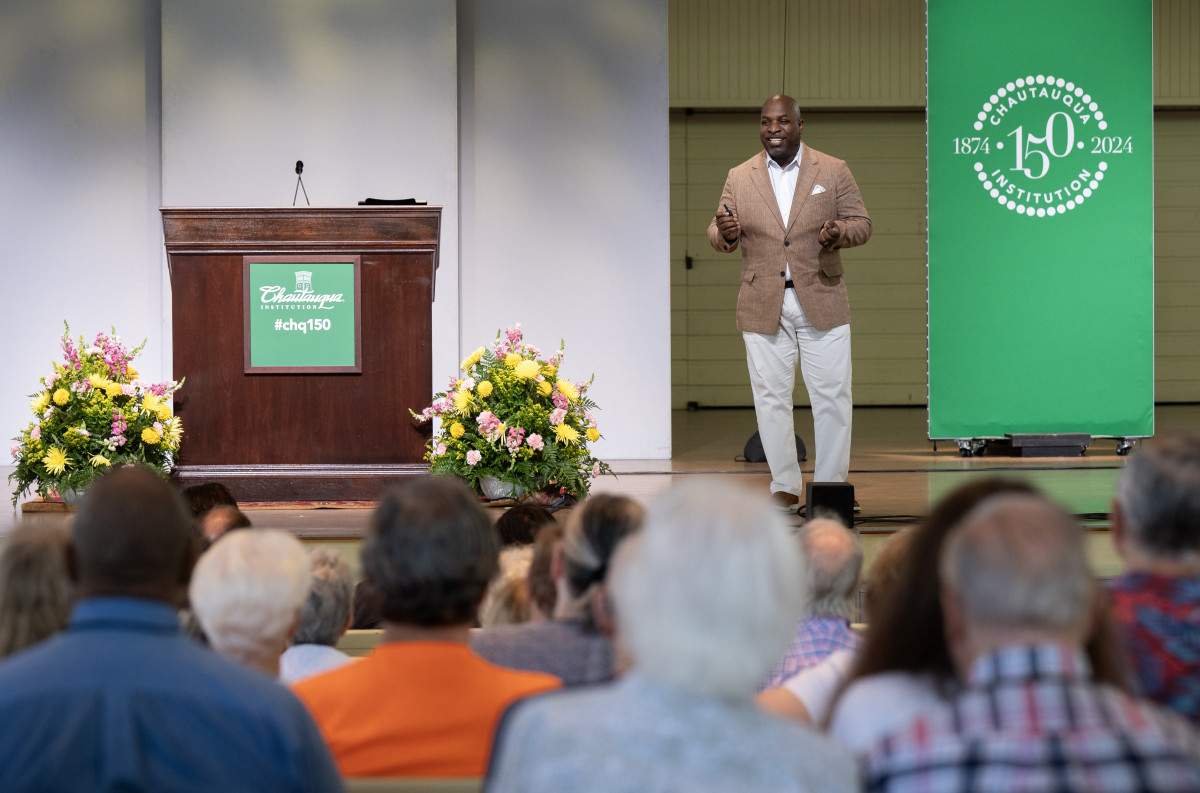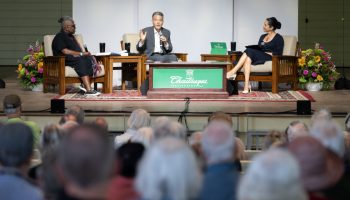
C.D. Glin, president of the PepsiCo Foundation and the global head of social impact at PepsiCo, speaks about the company’s sustainability efforts during his lecture Thursday in the Amphitheater.
As the global population rises beyond 8 billion, to 9 billion, even 10 billion, a critical question arises. What’s everyone going to eat? How is the future … fed?
That’s the question C.D. Glin, president of PepsiCo Foundation and PepsiCo’s global head of social impact, addressed with his morning lecture Thursday in the Amphitheater, speaking as part of the Chautauqua Lecture Series and its Week Four theme, “Eight Billion and Counting: The Future of Humankind in a Crowded World.”
His answer? Food system transformation. Such transformation will sustain and nourish the current population, as well as the future population, and address issues like climate change, environmental degradation, personal well-being, and food and water scarcity.
“I’m speaking from the perch of a global company that focuses on the food system,” Glin said. Not just focused on, but deeply embedded in and invested in — PepsiCo is America’s largest food and beverage company, and Glin rattled off the many, many products in PepsiCo’s portfolio.
“We are at the heart of food systems because at the end of the day, feeding 8 billion and counting, for us, is not a ‘nice to do.’ It’s not a ‘get to do.’ It’s actually a ‘must do.’ In order for our company to grow, to prosper, to survive and thrive, we have to be thinking about the future,” Glin said.
His company is “rooted in agriculture. PepsiCo is born in the fields.”
Potatoes? Lay’s Potato Chips. Corn? Doritos, Cheeto, Fritos, Tostitos — all of the “toes,” he said. And after all, there’s no Quaker Oats without oats.
“We’ve got to make great products so people buy them, but we also have to take care of people and the planet,” Glin said. “We have to ensure that people and the planet are at the heart of what we do.”
PepsiCo sources more than 35 crops, over 7 millions acres, in 60 countries, annually — and that goes right to the heart of food system transformation, and the company’s strategic plan.
“We’ve transformed our entire business,” Glin said. This means focusing on sustainable, regenerative and inclusive farming practices, and a goal of transitioning from a linear economy to a circular economy that emphasizes recycling, reusing and reducing.
That approach extends to PepsiCo’s commitment to be net-water positive, meaning it replenishes as much water as it takes from communities. It also means taking a hard look at a fun fact: PepsiCo owns the largest private fleet in America. That fleet — of tractors, trailers, trucks, are converting to electric vehicles as part of the company’s decarbonization efforts.
“A semi-truck that is running on diesel-emitting, greenhouse gas emissions, (transporting) water and plastic,” isn’t sustainable, Glin said, and consumers won’t always stand for it.
“We need to be more responsible,” he said, not just for the business, but for the planet. Even something like PepsiCo’s acquisition of SodaStream is an example of how the company is rethinking traditional distribution models and addressing societal needs through product innovations, like aiming to reduce salt, fat, and sugar in products.
PepsiCo is a big business; the pressure therein is a privilege, Glin said, and his work is to push the company to become even more of a positive force for good.
“We actually have the capability to address real issues, to create more equitable access for people who are food insecure, or for people who don’t have access to safe water, or people who are economically challenged,” he said. “… We also can think about social and economic mobility, helping people advance, helping people thrive.”
He drilled down on three areas in PepsiCo’s “social license to operate.” It knows food. It knows beverage. It knows, too, opportunity, by virtue of its more-than-300,000 employees and $91 billion in revenue in 2023.
That also means PepsiCo knows “the flipside” — food insecurity, a lack of access to safe drinking water, and inequity.
“If we can make a Cheeto, we probably can make a healthier product that addresses malnutrition,” Glin quipped, to applause. “If we use our capabilities for good, we probably could really address malnutrition and hunger in a unique way.”
He pointed to PepsiCo programs in Mexico, Guatemala and India that create products — not commercially available — to address anemia and “moderate malnutrition” in children. But food insecurity is also an issue at home, with about 2.6 million people in the United States not knowing where their next meal is coming from. One in 5 Black or Brown children, once school is dismissed on Friday, don’t know where (or when) their next meal will come until Monday morning. That number is 1 in 7 among all school-age children in America. Enter Food for Good, a program established by PepsiCo in 2009 that provides means for children after school, on the weekends and, critically, over the summer break.
PepsiCo also knows water, and safe water access. More than 2 billion live in water-stressed areas around the world; Glin said the goal was to be net-water positive through implementing rainwater harvesting, wastewater treatment, and water conservation programs.
“We made a commitment to impact 100 million people’s lives with consistent, long-term sustainable access to water,” he said. “We made that commitment about 10 years ago. Now we have impacted, and we can claim attribution for our contribution to, 91 million people having access on a consistent basis to safe drinking water.”
Again, it’s an issue that hits close to home — he pointed to Flint, Michigan, as well as water shortages in California. While those issues have become exacerbated in the United States in modern times, “in some places around the world, it’s always been a challenge.”
PepsiCo has the infrastructure to build the capacity of communities across the globe to access safe drinking water. With that, he took the audience to India, where PepsiCo Foundation’s Safe Water Network has created and expanded “small water enterprises” that purify local groundwater, making safe water affordable and reliable.
“This is philanthropy as social innovation, and as a social enterprise, to really create sustainable models in those communities,” Glin said.
PepsiCo is a food company, a beverage company, that creates opportunity — and Glin wanted to talk about economic opportunity and economic inclusion.
In the past three to four years, he said, society reached an inflection point.
“We, as a global community, were faced with something that had never happened before in any of our lifetimes, and that was the global pandemic,” Glin said. “Everywhere on the planet, (everyone) felt the same thing.”
COVID-19 also amplified fissures in society, where inequalities were highlighted and heightened. Certain communities were disproportionately impacted; access to education also took a hit, he said.
“We know that the gateway to the middle class is access to education,” Glin noted, referring to economist Homi Kharas’ Tuesday lecture, and argued specifically that it’s actually “access to education through community colleges.”
Historically, there’s no barrier to entry, he said, but during the pandemic, enrollment rates tanked — and they tanked among very specific populations.
“In African-American and Latino communities, (we saw) 19% decreased enrollment rates at community colleges,” he said. “And community college is literally this unsung hero of this gateway, this pathway to prosperity to the middle class.”
So the PepsiCo Foundation, four years ago, created a program with the goal of providing scholarships to 4,000 students to not just access community college, but advance to a four-year institution if they choose.
“We know there’s a barrier to entry financially, in terms of access to education, so we’ve taken it upon ourselves as a foundation in thinking about the workforce of the future,” Glin said. “PepsiCo understands that we need students who are skilled in digitization, technology-driven.”
That’s a real focus on economic opportunity for the workforce of the future, he said, “but what about the workforce now and those that were impacted (by COVID-19)?”
Forty-one percent of all Black-owned businesses, Glin said, went out of business permanently or temporarily in 2020 and 2021. Eighty-six percent of Hispanic businesses reported being “permanently or substantially hampered or disrupted by COVID-19, and they were disproportionately turned down for PPP loans.”
These businesses often didn’t have digital platforms, and the cost of digitization is high. In many cases, the mom-and-pop stores, the “holes in the wall,” didn’t even have the physical footprint for the required 6 feet of social distancing.
In response, the PepsiCo Foundation created an accelerator program for restaurants and small businesses, with a commitment of supporting 1,000 Black and Hispanic restaurants in the United States. Through the program, the businesses receive capital via grant funding, which gives mentoring and marketing support for management to strengthen digital capabilities, Glin said.
So — food security, safe water access, economic equality.
“Through the foundation and through the company, we bring corporate assets and expertise; sometimes we bring products,” he said. “We are bringing our people, 300,000 strong, and we’re bringing our philanthropy all to the fight for the future — to the 8 billion and counting.”
No one company or entity or sector will secure a prosperous future, he said; it will take “collective impact.” It is true, however, that business “needs to show up in a different way,” and Glin cited Harvard Business School’s Michael Porter, who helped created what’s called the shared-value model.
“He very clearly said the purpose of business is to create value for society,” Glin said, and listed other business leaders who have all said, in essence, “the time has come.”
“PepsiCo and the foundation are here at Chautauqua to really put ourselves on notice to you to say that we are in this fight with you,” Glin said, “for people and planet, to ensure that we have a prosperous future as we look at 8 billion and counting.”




